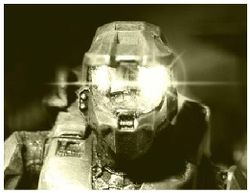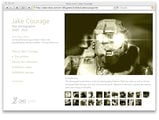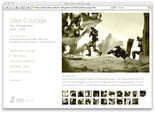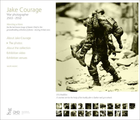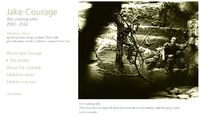Jake Courage: Difference between revisions
From Halopedia, the Halo wiki
No edit summary |
m (Text replacement - "\|(right|thumb)(\|[^\]\n]+)?\|(right|thumb)" to "|thumb$2") |
||
| (109 intermediate revisions by 54 users not shown) | |||
| Line 1: | Line 1: | ||
Jake Courage | {{Status|Canon}} | ||
{{Character infobox | |||
|variant=Human | |||
|name=Jake Courage | |||
|image=[[File:John-117 memorial29.jpg|300px]] | |||
|homeworld= | |||
|birth=[[2503]] | |||
|death=[[2552]] (aged 49) | |||
|causeofdeath= | |||
|parents= | |||
|siblings= | |||
|spouses= | |||
|children= | |||
|species= | |||
|gender=Male | |||
|height= | |||
|mass= | |||
|hair= | |||
|eyes= | |||
|affiliation=[[United Nations Space Command]] | |||
|rank= | |||
|sn= | |||
|notable= | |||
}} | |||
'''Jake Courage''' was a groundbreaking British war photographer, known for documenting the heroics of [[John-117]].<ref name="exhibit">'''[[Xbox.com]]''' - ''Jake Courage Exhibition'' (defunct)</ref> His work serves as a framing device for the [[Believe]] campaign. | |||
==Background== | |||
{{references|section}} | |||
Courage began his photojournalism career in [[2527]] on [[Reach]], where he was well known for his shocking and uncompromising style of photography. Many of his photos won awards – including his most famous, 'Killing Time', which won him the [[John Pilger Prize]] in [[2530]]. | |||
He remained on Reach for five years until a disagreement with his editor. Although the details remain ambiguous, it is believed that Courage wanted to print a series of pictures from a deadly [[Unggoy]] attack. His editor refused on the grounds that they were too graphic, causing Jake Courage to leave the paper and stage his own exhibition. The photos won him critical acclaim and set him up as a well-respected war photographer. | |||
From 2532 onwards, he continued to expose the truth behind war with harrowing pictures from the frontlines against the Covenant. It was during this time that he earned the trust and respect of the [[77th Marine Regiment]], including [[Master Chief Petty Officer]] [[John-117]] – to whom he became a loyal companion. | |||
The photos covering the [[Battle of Mombasa]] in 2552 are undoubtedly his most famous. His unlimited access to the UNSC regiment resulted in a series of photographs that enabled the world to see the heroic acts of the soldiers in battle – including John-117. In a quote from Jake Courage taken during the battle, he said, ''"I’ve got to know these soldiers’ lives intimately. One man, I consider my friend... he is the human face of war. He is Spartan 117, he is Master Chief."'' | |||
This was also the last photo he ever took, as he was killed in that very same battle by a [[grenade]]. He left behind a wife, [[Mary Courage|Mary]], and a son, [[John Courage|John]], whom he presumably named after the Spartan.{{Ref/Reuse|exhibit}} | |||
After the war, his collection of photography from the battle, titled 'Shooting a Hero', was displayed throughout the United Kingdom; specifically, in Birmingham, Bristol, Cheshire, Doncaster, Edinburgh, Leeds, [[London]], Plymouth, Portsmouth, Reading, Romford and Sheffield.{{Ref/Reuse|exhibit}} | |||
== Controversy == | == Controversy == | ||
{{quote|I hate blood and I hate violence. So what possessed me to choose to be a war photographer? Because I’m drawn to heroes. I’m drawn to the selfless act of someone putting their own life on the line for the sake of humanity. Because amongst the horror and the madness, I like to think I can show that some good can come out of something so horrific.|Jake Courage in October 2552, before heading to the Battle of New Mombasa}} | |||
Courage’s photos have always been the subject of some controversy, suffering under the argument that war photography can | Courage’s photos have always been the subject of some controversy, suffering under the argument that war photography can desensitize the public to scenes of violence and death. However, Courage always argued the power of the image can make more noise and have a greater impact than a gun can ever have. | ||
== Photography equipment == | |||
[[File:MC jake courage.jpg|thumb|250px|Jake Courage's famous photo of the Master Chief.]] | |||
Traditionally, war photographers use an inbuilt retina camera or helmet-cam; however, Courage preferred more traditional methods that enabled him to have more control over his landscape. He mainly used a Dynamo 507 3D with ultra 4Res lens and quadric digital transfer. The 900-nanosecond transfer rate enabled photos to be transferred back to base instantly. His equipment was always coated in a substance made from titanium and cockroach shell that enabled it to withstand the radiation. It should also be noted that he preferred to shoot in an archaic sepia tone instead of full tonal color. | |||
== Awards == | == Awards == | ||
* The [[John Pilger Prize]] for 'Killing Time' in 2530. | |||
* The [[International War Photography Prize]] for 'Screams in Space' in 2529 and 'Dead on Arrival' in 2538. | |||
* The [[MoH Lifetime Achievement Award]] for 'Flies on Flesh' in 2534. | |||
* Gold Medal in the [[WPP Awards]] in 2543. | |||
==Gallery== | |||
<gallery> | |||
File:Jake Courage 2.jpg|Jake Courage Website. Image 1 | |||
File:Jake_Courage_3.jpg|Jake Courage Website. Image 4 | |||
File:Jake courage 1.png|Jake Courage Website. Image 15 | |||
File:Jake_Courage_4.png|Jake Courage Website. Image 21 | |||
== | </gallery> | ||
==Sources== | |||
{{Ref/Sources}} | |||
[[Category: | [[Category:Human civilians|Courage, Jake]] | ||
[[Category:Human characters]] | |||
Latest revision as of 12:55, April 12, 2023
| Jake Courage | |
|---|---|
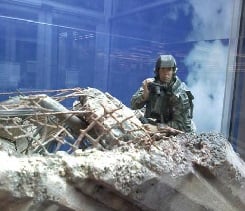
| |
| Biographical information | |
|
Born: |
|
|
Died: |
2552 (aged 49) |
| Personal details | |
|
Gender: |
Male |
| Political and military information | |
|
Affiliation: |
|
Jake Courage was a groundbreaking British war photographer, known for documenting the heroics of John-117.[1] His work serves as a framing device for the Believe campaign.
Background[edit]
| This section does not have enough inline citations and/or does not adhere to the proper citation format. You can help Halopedia by adding citations. |
Courage began his photojournalism career in 2527 on Reach, where he was well known for his shocking and uncompromising style of photography. Many of his photos won awards – including his most famous, 'Killing Time', which won him the John Pilger Prize in 2530.
He remained on Reach for five years until a disagreement with his editor. Although the details remain ambiguous, it is believed that Courage wanted to print a series of pictures from a deadly Unggoy attack. His editor refused on the grounds that they were too graphic, causing Jake Courage to leave the paper and stage his own exhibition. The photos won him critical acclaim and set him up as a well-respected war photographer.
From 2532 onwards, he continued to expose the truth behind war with harrowing pictures from the frontlines against the Covenant. It was during this time that he earned the trust and respect of the 77th Marine Regiment, including Master Chief Petty Officer John-117 – to whom he became a loyal companion.
The photos covering the Battle of Mombasa in 2552 are undoubtedly his most famous. His unlimited access to the UNSC regiment resulted in a series of photographs that enabled the world to see the heroic acts of the soldiers in battle – including John-117. In a quote from Jake Courage taken during the battle, he said, "I’ve got to know these soldiers’ lives intimately. One man, I consider my friend... he is the human face of war. He is Spartan 117, he is Master Chief."
This was also the last photo he ever took, as he was killed in that very same battle by a grenade. He left behind a wife, Mary, and a son, John, whom he presumably named after the Spartan.[1]
After the war, his collection of photography from the battle, titled 'Shooting a Hero', was displayed throughout the United Kingdom; specifically, in Birmingham, Bristol, Cheshire, Doncaster, Edinburgh, Leeds, London, Plymouth, Portsmouth, Reading, Romford and Sheffield.[1]
Controversy[edit]
- "I hate blood and I hate violence. So what possessed me to choose to be a war photographer? Because I’m drawn to heroes. I’m drawn to the selfless act of someone putting their own life on the line for the sake of humanity. Because amongst the horror and the madness, I like to think I can show that some good can come out of something so horrific."
- — Jake Courage in October 2552, before heading to the Battle of New Mombasa
Courage’s photos have always been the subject of some controversy, suffering under the argument that war photography can desensitize the public to scenes of violence and death. However, Courage always argued the power of the image can make more noise and have a greater impact than a gun can ever have.
Photography equipment[edit]
Traditionally, war photographers use an inbuilt retina camera or helmet-cam; however, Courage preferred more traditional methods that enabled him to have more control over his landscape. He mainly used a Dynamo 507 3D with ultra 4Res lens and quadric digital transfer. The 900-nanosecond transfer rate enabled photos to be transferred back to base instantly. His equipment was always coated in a substance made from titanium and cockroach shell that enabled it to withstand the radiation. It should also be noted that he preferred to shoot in an archaic sepia tone instead of full tonal color.
Awards[edit]
- The John Pilger Prize for 'Killing Time' in 2530.
- The International War Photography Prize for 'Screams in Space' in 2529 and 'Dead on Arrival' in 2538.
- The MoH Lifetime Achievement Award for 'Flies on Flesh' in 2534.
- Gold Medal in the WPP Awards in 2543.
